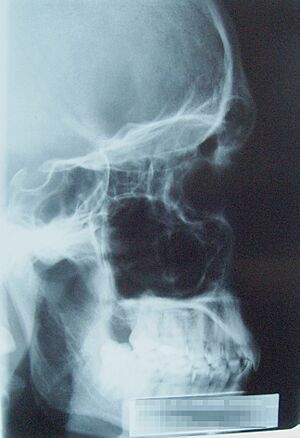Paranasal sinuses facts for kids
The paranasal sinuses are air-filled spaces found in the bones around your nose and eyes. They are connected to your nasal cavity, which is the inside of your nose. These sinuses are lined with a special moist skin called a mucous membrane. This membrane helps to keep the air you breathe warm and moist before it reaches your lungs.

What are Paranasal Sinuses?
Your skull might look heavy, but it has these clever air-filled spaces inside it. Think of them like tiny balloons within your bones! These spaces make your skull look bigger without adding much weight. This is helpful for your head.
You can find paranasal sinuses in many animals, not just humans. They are present in mammals, most birds, dinosaurs, and even crocodilians. Since almost all land vertebrates have them, scientists believe they must be very important.
How Do Sinuses Work?
The inside of your sinuses is covered with a mucosa. This is a moist layer of cells that produces mucus. Mucus is a sticky substance that helps to:
- Warm and moisten the air: As you breathe in, the air passes through your nose and into your sinuses. The mucosa warms and moistens this air, making it easier for your lungs to handle.
- Trap tiny particles: The sticky mucus also catches tiny dust particles, germs, and other things that might be in the air you breathe. This stops them from getting into your lungs and making you sick. Tiny hairs called cilia then sweep this mucus and trapped particles towards your throat, where you can swallow or cough them out.
Why Do We Have Sinuses?
Scientists have several ideas about why we have paranasal sinuses. Here are some of the main thoughts:
- Lighter skull: They help to make the front of your skull, especially your face bones, lighter.
- Voice sound: They might help your voice sound stronger or clearer, like a natural echo chamber.
- Protection: They could act like airbags, protecting your face and important parts like your eyes and teeth from damage if you get hit.
- Temperature control: They might help protect sensitive parts, like the roots of your teeth and your eyes, from sudden changes in air temperature.
- Air conditioning: They help to humidify and warm the air you breathe in. This is important because the air stays in the sinuses for a little while, allowing it to get ready for your lungs.
- Immune defense: They play a role in your body's defense system, helping to fight off infections.
See also
 In Spanish: Senos paranasales para niños
In Spanish: Senos paranasales para niños

